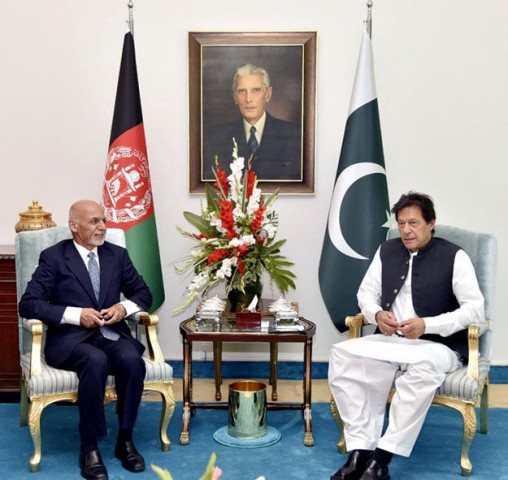Where lies the road to peace in Afghanistan?
Improvement in Pak-Afghan relationship is also linked to the forward movement in ties between Islamabad and New Delhi

Last week, Afghan President Ashraf Ghani led a high-powered delegation to Pakistan. This was his first visit to Pakistan since 2015 and came against the backdrop of the ongoing efforts for a political solution to the 18-year long conflict in Afghanistan. Ghani’s visit is seen as part of the latest push by Pakistan to reset ties with its western neighbour – ties that are often marred by mistrust and blame game. The Afghan President had in the past spurned Pakistan’s overtures but this time accepted the invitation from Prime Minister Imran Khan.
The statement issued after the meeting between Ghani and Imran spoke about opening a new chapter of friendship and cooperation between the two neighbours. The two leaders agreed to develop a ‘forward looking vision’ instead of competing for political interests.
The visit may have eased friction but the larger question remains: can the two countries sustain this positive momentum? We have seen in the past that such bonhomie has proven to be short-lived. When Ghani first visited Pakistan after his election as President in 2014, there was more than optimism that relations between the two countries under his term would see a qualitative change. Unlike, his predecessor Hamid Karzai, he had also visited the General Headquarters in Rawalpindi. So much so that he had postponed a visit to New Delhi to sign strategic pact with India in order to underline his priorities. But it did not take long when the familiar pattern returned. Like Karzai, Ghani also reverted to the old template accusing Pakistan of supporting the Afghan Taliban. He repeatedly kept saying that solution to the unrest in his country lies not in Afghanistan but Pakistan in a veiled reference to Islamabad’s alleged backing of the insurgents.
So, has anything changed now that has prompted Ghani to accept another olive branch from Pakistan? There appears to be multiple reasons. First, since the PTI government took charge, there have been concerted efforts from behind the scenes to reach out to the Afghan government. Those efforts lead to a flurry of high-level exchanges between the two countries. Secondly, the Ghani administration, feeling increasingly isolated in the ongoing peace talks between the US and Taliban, realised the need for reengaging with Pakistan.
The main obstacle in the way of improving Pak-Afghan ties is the trust deficit. Afghanistan has this suspicion that Pakistan still controls the Taliban and through them wants to install a government of its liking. Islamabad, however, time and again tried to dismiss this misperception. The other factor that has compounded the problem is anti-Pakistan sentiment currently prevalent among the young Afghans who think Pakistan is responsible for the current mess in their country. This is ironic given that fact that many young Afghans have grown up in Pakistan since their parents fled the war in 1979.
But other factors have also contributed to such misgivings. For example Pakistan believes that Afghanistan is providing shelter to groups involved in cross-border attacks. Islamabad minced no words in pointing fingers at National Directorate of Security (NDS) for working with Indian RAW to create trouble in Pakistan.
Clearly, the issues facing the two countries are far bigger to be resolved during a single visit. More importantly improvement in Pak-Afghan relationship is also in a way linked to the forward movement in ties between Islamabad and New Delhi. India is wary of Pakistan’s role in Afghanistan while Islamabad is concerned that New Delhi’s growing influence in its backyard would jeopardise its strategic interests. This means rapprochement between Pakistan and India will actually determine the future course of Afghanistan and not necessarily the recent visit of Ghani.













COMMENTS
Comments are moderated and generally will be posted if they are on-topic and not abusive.
For more information, please see our Comments FAQ